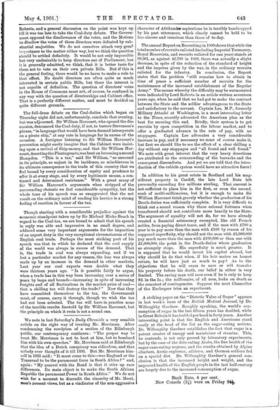In addition to his great estate in Scotland and his
mag- nificent property in Cardiff, the late Lord Bute left personalty exceeding five millions sterling. That amount is not sufficient to place him in the first, or even the second. rank of multi-millionaires, but it is enough to make Sir William Harcourt think gravely whether the graduation of his Death-duties was sufficiently complete. It is very difficult to think out a sound reason why these colossal fortunes when transferred should not contribute more heavily to the State. The argument of equality will not do, for we have already created a financial aristocracy exempted, like old French nobles, from paying direct taxes, and if the man with £700 a year is to pay more than the man with £160 by reason of his supposed superfluity, why should not the man with £5,000,000 pay much more than the man with £100,000 or than one with £1,000,000, the point in the Death-duties where graduation so strangely stops. His superfluity is much greater. It is supposed that he would invest his capital abroad, but why should he do that when, if his heir makes an honest return, he will have just as much to pay ? As to the objections that he will cease to save or will transfer his property before his death, our belief in either is very limited. The saving man will save even if he is only to keep 9d. in the ls.; the millionaire, of all men, looks on death as the remotest of contingencies. Suppose the next Chancellor of the Exchequer tries an experiment.










































 Previous page
Previous page